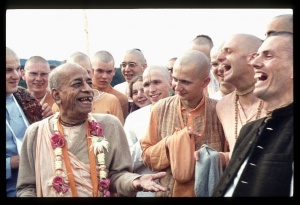SB 5.6.7: Difference between revisions
m (1 revision(s)) |
m (Text replacement - "==== <div class=" to "==== <div class=") |
||
| Line 1: | Line 1: | ||
{{info | {{info | ||
|speaker= | |speaker=Śukadeva Gosvāmī | ||
|listener=King | |listener=King Parīkṣit | ||
}} | }} | ||
[[Category:Srimad-Bhagavatam - Canto 05 Chapter 06|S07]] | |||
[[Category:Bhagavatam Verses Spoken by Sukadeva Gosvami - Vanisource|050607]] | |||
<div style="float:left">'''[[Srimad-Bhagavatam]] - [[SB 5|Fifth Canto]] - [[SB 5.6: The Activities of Lord Rsabhadeva|Chapter 6: The Activities of Lord Ṛṣabhadeva]]'''</div> | |||
<div style="float:right">[[File:Go-previous.png|link=SB 5.6.6]] '''[[SB 5.6.6]] - [[SB 5.6.8]]''' [[File:Go-next.png|link=SB 5.6.8]]</div> | |||
{{RandomImage}} | |||
==== TEXT 7 ==== | ==== TEXT 7 ==== | ||
<div class="verse"> | |||
<div | :tasya ha vā evaṁ mukta-liṅgasya bhagavata ṛṣabhasya | ||
tasya ha vā evaṁ mukta-liṅgasya bhagavata ṛṣabhasya yogamāyā-vāsanayā deha imāṁ jagatīm abhimānābhāsena saṅkramamāṇaḥ koṅka-veṅka-kuṭakān dakṣiṇa-karṇāṭakān deśān yadṛcchayopagataḥ kuṭakācalopavana āsya kṛtāśma-kavala unmāda iva mukta-mūrdhajo 'saṁvīta eva vicacāra | :yogamāyā-vāsanayā deha imāṁ jagatīm abhimānābhāsena saṅkramamāṇaḥ | ||
:koṅka-veṅka-kuṭakān dakṣiṇa-karṇāṭakān deśān yadṛcchayopagataḥ | |||
:kuṭakācalopavana āsya kṛtāśma-kavala unmāda iva mukta-mūrdhajo 'saṁvīta eva vicacāra | |||
</div> | </div> | ||
| Line 14: | Line 22: | ||
==== SYNONYMS ==== | ==== SYNONYMS ==== | ||
<div class="synonyms"> | |||
<div | ''tasya''—of Him (Lord Ṛṣabhadeva); ''ha vā''—as it were; ''evam''—thus; ''mukta-liṅgasya''—who had no identification with the gross and subtle body; ''bhagavataḥ''—of the Supreme Personality of Godhead; ''ṛṣabhasya''—of Lord Ṛṣabhadeva; ''yoga-māyā-vāsanayā''—by the accomplishment of yogamāyā for the purpose of the Lord's pastimes; ''dehaḥ''—body; ''imām''—this; ''jagatīm''—earth; ''abhimāna-ābhāsena''—with the apparent conception of having a body of material elements; ''saṅkramamāṇaḥ''—traveling; ''koṅka-veṅka-kuṭakān''—Koṅka, Veṅka and Kuṭaka; ''dakṣiṇa''—in South India; ''karṇāṭakān''—in the province of Karṇāṭa; ''deśān''—all the countries; ''yadṛcchayā''—of His own accord; ''upagataḥ''—reached; ''kuṭakācala-upavane''—a forest near Kuṭakācala; ''āsya''—within the mouth; ''kṛta-aśma-kavalaḥ''—having put a mouthful of stone; ''unmādaḥ iva''—just like a madman; ''mukta-mūrdhajaḥ''—having scattered hair; ''asaṁvītaḥ''—naked; ''eva''—just; ''vicacāra''—traveled. | ||
</div> | </div> | ||
| Line 22: | Line 29: | ||
==== TRANSLATION ==== | ==== TRANSLATION ==== | ||
<div class="translation"> | |||
<div | |||
Actually Lord Ṛṣabhadeva had no material body, but due to yogamāyā, He considered His body material, and therefore, because He played like an ordinary human being, He gave up the mentality of identifying with it. Following this principle, He began to wander all over the world. While traveling, He came to the province of Karṇāṭa in South India and passed through Koṅka, Veṅka and Kuṭaka. He had no plan to travel this way, but He arrived near Kuṭakācala and entered a forest there. He placed stones within His mouth and began to wander through the forest, naked and with His hair disheveled like a madman. | Actually Lord Ṛṣabhadeva had no material body, but due to yogamāyā, He considered His body material, and therefore, because He played like an ordinary human being, He gave up the mentality of identifying with it. Following this principle, He began to wander all over the world. While traveling, He came to the province of Karṇāṭa in South India and passed through Koṅka, Veṅka and Kuṭaka. He had no plan to travel this way, but He arrived near Kuṭakācala and entered a forest there. He placed stones within His mouth and began to wander through the forest, naked and with His hair disheveled like a madman. | ||
</div> | </div> | ||
__NOTOC__ | |||
<div style="float:right; clear:both;">[[File:Go-previous.png|link=SB 5.6.6]] '''[[SB 5.6.6]] - [[SB 5.6.8]]''' [[File:Go-next.png|link=SB 5.6.8]]</div> | |||
__NOTOC__ | |||
__NOEDITSECTION__ | |||
Revision as of 15:36, 14 November 2018

A.C. Bhaktivedanta Swami Prabhupada
TEXT 7
- tasya ha vā evaṁ mukta-liṅgasya bhagavata ṛṣabhasya
- yogamāyā-vāsanayā deha imāṁ jagatīm abhimānābhāsena saṅkramamāṇaḥ
- koṅka-veṅka-kuṭakān dakṣiṇa-karṇāṭakān deśān yadṛcchayopagataḥ
- kuṭakācalopavana āsya kṛtāśma-kavala unmāda iva mukta-mūrdhajo 'saṁvīta eva vicacāra
SYNONYMS
tasya—of Him (Lord Ṛṣabhadeva); ha vā—as it were; evam—thus; mukta-liṅgasya—who had no identification with the gross and subtle body; bhagavataḥ—of the Supreme Personality of Godhead; ṛṣabhasya—of Lord Ṛṣabhadeva; yoga-māyā-vāsanayā—by the accomplishment of yogamāyā for the purpose of the Lord's pastimes; dehaḥ—body; imām—this; jagatīm—earth; abhimāna-ābhāsena—with the apparent conception of having a body of material elements; saṅkramamāṇaḥ—traveling; koṅka-veṅka-kuṭakān—Koṅka, Veṅka and Kuṭaka; dakṣiṇa—in South India; karṇāṭakān—in the province of Karṇāṭa; deśān—all the countries; yadṛcchayā—of His own accord; upagataḥ—reached; kuṭakācala-upavane—a forest near Kuṭakācala; āsya—within the mouth; kṛta-aśma-kavalaḥ—having put a mouthful of stone; unmādaḥ iva—just like a madman; mukta-mūrdhajaḥ—having scattered hair; asaṁvītaḥ—naked; eva—just; vicacāra—traveled.
TRANSLATION
Actually Lord Ṛṣabhadeva had no material body, but due to yogamāyā, He considered His body material, and therefore, because He played like an ordinary human being, He gave up the mentality of identifying with it. Following this principle, He began to wander all over the world. While traveling, He came to the province of Karṇāṭa in South India and passed through Koṅka, Veṅka and Kuṭaka. He had no plan to travel this way, but He arrived near Kuṭakācala and entered a forest there. He placed stones within His mouth and began to wander through the forest, naked and with His hair disheveled like a madman.